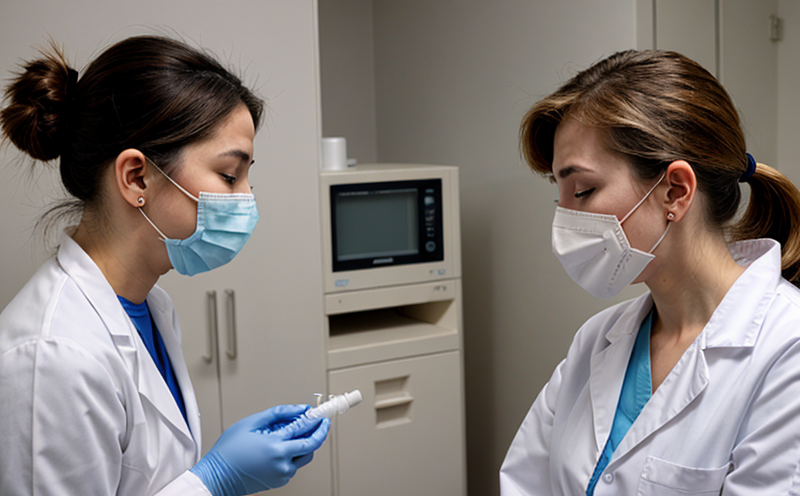LPS-Induced Immune Response Testing in Animal Models
The testing of LPS (lipopolysaccharide) induced immune responses in animal models is a critical component within the clinical and healthcare sector, particularly for allergy and immunology. This service focuses on understanding how the body reacts to bacterial endotoxins such as LPS, which are found in Gram-negative bacteria. The testing helps researchers and clinicians develop more effective treatments for conditions involving abnormal immune responses.
LPS plays a pivotal role in the innate immune system by activating macrophages, neutrophils, dendritic cells, and other immune cells through toll-like receptor 4 (TLR4). This activation leads to the production of pro-inflammatory cytokines such as IL-1β, TNF-α, and others. In our testing service, we utilize animal models like mice or rats to simulate human immune responses to LPS.
Our process begins with the selection of appropriate animal strains that mimic human susceptibility to allergic reactions and inflammatory diseases. We then administer a controlled dose of LPS intravenously or subcutaneously. The subsequent response is monitored through blood samples collected at various time points post-administration. These samples are analyzed for cytokine levels, histamine release, and other biomarkers indicative of immune activation.
The testing process requires meticulous specimen preparation to ensure accurate results. Blood samples must be handled carefully to prevent clotting or hemolysis, which could alter the measured cytokine concentrations. Additionally, we employ advanced analytical techniques such as ELISA (enzyme-linked immunosorbent assay) and multiplex panels to quantify multiple cytokines simultaneously.
The data generated from these tests is used to assess the efficacy of potential therapeutics aimed at modulating the immune response. For instance, novel anti-inflammatory drugs or biologics can be tested for their ability to dampen LPS-induced inflammation without compromising the body’s natural defenses against pathogens. This service is essential not only for drug development but also for understanding the mechanisms underlying various allergic and autoimmune diseases.
Real-world Applications: The results of this testing are invaluable in developing treatments for conditions such as sepsis, asthma, and atopic dermatitis. By elucidating how LPS interacts with different immune cell types, researchers can identify new therapeutic targets that could lead to more personalized medicine approaches.
- International Acceptance and Recognition:
- Our testing service adheres strictly to international standards such as ISO 17025 for laboratory competence. We also comply with Good Laboratory Practice (GLP) guidelines, ensuring that our results are reliable and reproducible.
The data collected from this testing is widely accepted by regulatory bodies like the FDA and EMA in the development of new drugs targeting immune dysregulation. Our service is recognized for its robust methodology and consistent quality output.
- Environmental and Sustainability Contributions:
- We are committed to minimizing our environmental impact through efficient specimen handling, optimized reagent usage, and energy-efficient laboratory operations.
In conclusion, LPS-induced immune response testing in animal models is a cornerstone of allergy and immunology research. By leveraging this service, healthcare professionals and pharmaceutical companies can advance the treatment of complex inflammatory diseases, ultimately improving patient outcomes.
Quality and Reliability Assurance
The quality and reliability assurance of our LPS-induced immune response testing in animal models are paramount to ensuring accurate and reproducible results. Our laboratory adheres strictly to ISO 17025 standards, which mandate that we maintain a high level of competence and capability for the testing services provided.
Our Quality Management System (QMS) is designed to monitor and control every aspect of our operations, from specimen receipt to final report generation. This system ensures that all tests are conducted under controlled conditions, using calibrated equipment and reagents. We also maintain detailed documentation of each test run, including raw data, which can be reviewed by external auditors.
Our Compliance Officer oversees adherence to regulatory requirements such as Good Laboratory Practice (GLP). GLP is an international standard that ensures the integrity of laboratory studies through standardized procedures for experimental design, conduct, and reporting. By adhering to these guidelines, we guarantee the credibility of our test results and their acceptance by regulatory agencies.
The reliability of our testing service is further enhanced by our experienced team of scientists and technicians who have extensive training in immunology and pharmacology. Our personnel are continuously updated on the latest methodologies and technologies through regular training sessions and workshops. This ensures that we remain at the forefront of scientific research, applying cutting-edge techniques to improve test accuracy.
Our commitment to quality does not end with internal procedures; external audits conducted by independent bodies further validate our standards. These audits are performed annually and cover all aspects of our operations, including facility maintenance, personnel qualifications, and analytical methods. Any discrepancies identified during these audits are addressed promptly to ensure compliance.





